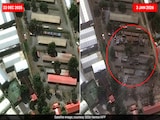- Google's Android Earthquake Alerts System underestimated the 7.8 magnitude Turkey quake in 2023
- Only 469 high-priority Take Action alerts were sent despite 10 million eligible users nearby
- Around 500,000 users received lower-level Be Aware warnings during the first quake
Google's Android Earthquake Alerts System (AEA) failed to accurately warn people ahead of the 2023 Turkey earthquake, which killed more than 55,000 people and injured over 1 lakh, the tech giant has admitted. The twin quakes, measuring 7.8 and 7.5 in magnitude, flattened buildings across southeastern Turkey and northern Syria in the early hours of February 6, catching millions asleep.
Despite being live and operational at the time, the system underestimated the severity of the first 7.8-magnitude quake, the BBC reported. According to Google, only 469 "Take Action" alerts (its highest-priority warnings) were sent out, even though up to 10 million people within 160 km of the epicentre were eligible to receive them. Instead, around half a million users were sent a lower-level "Be Aware" warning, which is designed for light shaking and does not trigger loud alerts or override 'Do Not Disturb' settings.
The system runs on Android devices, which make up over 70 per cent of mobile phones in Turkey, and is meant to detect ground movement via sensors in smartphones and quickly notify users before the strongest shaking arrives. During the quake, Google's detection algorithm estimated the shaking at between 4.5 and 4.9 on the moment magnitude scale, which was far below the actual 7.8 magnitude.
"We continue to improve the system based on what we learn in each earthquake," a Google spokesperson told the BBC, after months of scrutiny. The company previously claimed the system "performed well."
The quake struck at 04:17 am, when most people were asleep and unaware of the impending danger. The "Take Action" alert, which produces a loud, intrusive alarm, would have been crucial in waking users and giving them time to seek safety. But in the months following the disaster, BBC researchers were unable to find a single person in affected areas who received this critical alert before the quake hit.
Google researchers later published findings in the journal Science, acknowledging "limitations to the detection algorithms." For the second large quake later that day, the system did perform somewhat better, sending 8,158 Take Action alerts and just under four million Be Aware notifications.
Following the disaster, Google improved its algorithm and re-ran a simulation of the first earthquake. This time, the system would have sent out 10 million Take Action alerts and 67 million Be Aware alerts.
The AEA system is now active in 98 countries, and Google claims it has been improved based on learnings from Turkey's quake.















